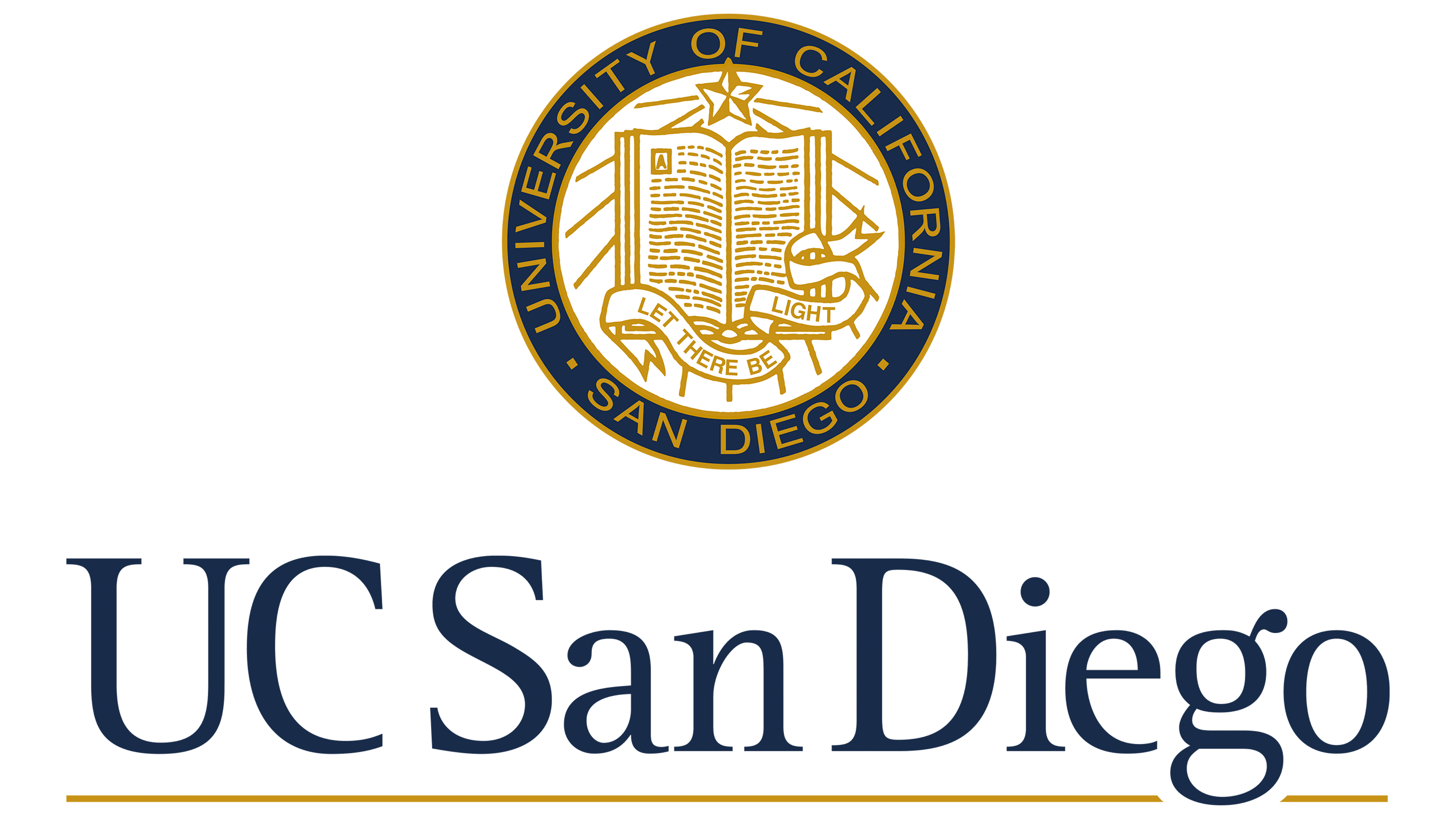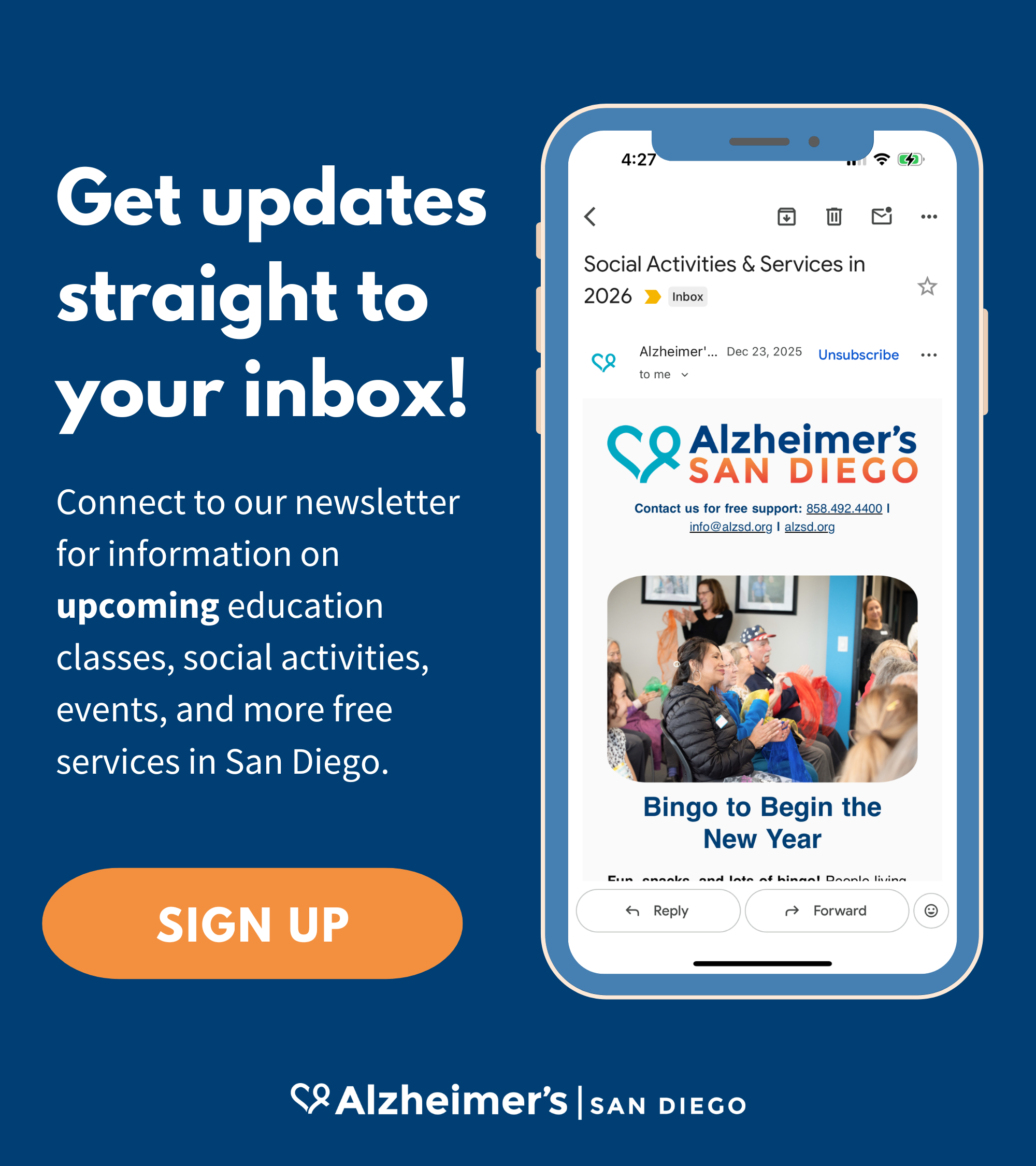Clinical Trials
A worldwide quest is under way to find treatments to stop, slow or even prevent Alzheimer’s disease. Some of the most promising research is happening right here in San Diego. Many of the new drugs in development aim to modify the disease process by impacting the many brain changes that Alzheimer’s causes. Current trials in San Diego County range from drug research to studying the impact of sleep on cognitive decline and caregiver stress.
People with Alzheimer’s, caregivers and healthy volunteers are needed today to participate in Alzheimer’s and dementia research. When you join a clinical trial, you have an opportunity to participate in critical research that could change the course of Alzheimer’s disease and improve the lives of all those it affects. By signing up to learn more, Alzheimer’s San Diego will send you the latest information about local studies that could be a good fit for you.
We need your help. Without participation, finding a cure is virtually impossible.
Current Research in San Diego
Thank you to our valued clinical trials partners, featured below. Their support helps keep our services free to the community.
Alzheimer’s Therapeutic Research Institute (Keck School of Medicine of USC)
Dedicated to helping the nation and the world confront the problem of Alzheimer’s Disease (AD) by rigorously testing novel treatments and identifying reliable markers for early detection of the disease.
- Alzheimer Prevention Trials (APT) Webstudy: An online cognitive assessment research study aimed at accelerating the enrollment time for clinical trials designed to prevent Alzheimer’s disease. The purpose of the webstudy is to develop a large online group of individuals who may be at higher risk for developing Alzheimer’s dementia, and who may be interested in participating in a prevention trial.
For more information and additional trials, call 858-964-4644 or visit atri.usc.edu/studies/.
Sharp Neurocognitive Research Center
Study for people diagnosed with Alzheimer’s disease and are experiencing symptoms associated with Alzheimer’s Disease Psychosis (ADP). SHARP will assess the efficacy and safety of the drug ML-007C-MA in male and female participants aged 55 to 90 years with ADP symptoms like hallucinations, delusions, and paranoia. Contact: Esteban Gonzalez, MS (858-836-8350 / esteban.gonzalez@sharp.com) More information >
To find Sharp studies and trials, click here.
Please note: Insurance is not required for study participation. Participants and study partners are compensated for time and travel, and transportation can be provided for each study visit. For more information call 858-836-8350 or visit sharp.com/clinicaltrials.
University of California – San Diego
TREAD study: What if the key to better brain health isn’t just what you eat but when you eat? Dr. Paula Desplats’ lab and the Alzheimer’s Disease Research Center at UCSD are exploring this question, which investigates how mealtimes affect Alzheimer’s disease symptoms. This study investigates whether prolonged nightly fasting (14 hours) is feasible for patients diagnosed with mild cognitive impairment or Alzheimer’s, and will evaluate outcome measures related to pathology, cognition, circadian regulation, sleep, and markers of inflammation and aging. TREAD lasts for 6 months and only requires three in-person visits. As part of the study, participants wear an ActiGraph, similar to a wristwatch, to collect data about physical activity and sleep for two weeks around the visit times. Additionally, the study offers a compensation of up to $225. If you are interested in learning more about the study, contact the TREAD team at TREAD@health.ucsd.edu or leave a message via phone at (858) 822-3182.
AAV2-BDNF Gene Therapy Clinical Trial: Doctors at UC San Diego are seeking patients with early stage Alzheimer’s Disease and Mild Cognitive Impairment to participate in a research study of gene therapy. The purpose of this study is to determine whether gene therapy with a brain protein is safe. In animal studies, this brain protein slows cell death and activates the brain. This experimental gene therapy program involves a one-time surgical procedure. Individuals in the early stages of Alzheimer’s Disease or Mild Cognitive Impairment (MCI) who are between the ages of 50–80 and are otherwise healthy may be eligible. There are no costs for study participation. If you are interested in finding out whether you are eligible to participate, please contact Ms. Lori Graham at UCSD, at 858-534-8857 or by email: ljgraham@health.ucsd.edu.
CARE2SLEEP study: Enrolling caregivers who experience sleeping difficulties. The study does not entail any medications. Contact by email: caregiverlab@ucsd.edu
SALUD-Tech study: This study is for Hispanic/Latinos of all genders ages 50 to 70. The study aims to learn whether information collected from smartphones and smartwatches can help detect risk for developing a disease of the brain later in life, such as Alzheimer’s disease. Participants receive compensation, as well as the results of memory testing and routine blood tests at no cost. Visits can be completed in our offices in Chula Vista or La Jolla (transportation can be provided), or we can go to you. If interested in learning more, please call 619-373-4735 or email us at salud-techucsd@health.ucsd.edu. Both English and Spanish-speakers are welcome.
Sleep Research study (with UCLA): Enrolling caregivers to test a smartphone-based tool to asses cognitive health. The study does not entail any medications. Contact by email: SleepResearch@sonnet.ucla.edu / Flyer >
University of San Diego
Study for Caregivers – The study “Validity of Functional Assessment Staging by Caregivers” put on by the Hahn School of Nursing at USD is looking for caregivers to help evaluate a mobile phone app about the stages of dementia. Contact: Shelby Bernauer (sbernauer@sandiego.edu / 858-630-1994). Learn more >
Additional research opportunities in San Diego County:
- UC San Diego Healthcare Robotics Lab – We have several opportunities for volunteers to participate in research to collaboratively design new assistive technologies that support people with dementia and mild cognitive impairment and their care partners. For more information, please contact Michele Murakami, sch-studies@ucsd.edu or (619) 354-1197. Both English and Spanish speakers are welcome.
- Shiley-Marcos Alzheimer’s Disease Research Center – The Shiley-Marcos ADRC has a wide variety of opportunities for volunteers to participate in important research studies designed to discover ways to prevent, treat, and ultimately eradicate Alzheimer’s disease as well as other related neurological diseases. Call the ADRC 858-822-4800 and ask for Tracey Truscott, LCSW for more information or email ttruscott@ucsd.edu.
- The Neurology Center of Southern California – The Research Center is currently enrolling in studies for Alzheimer’s disease. Please contact Estela at 619-432-0867.
- UCSD Center for Healthy Aging
Find additional research opportunities in the United States:
- Alzheimer’s Clinical Trial Consortium
- National Institutes of Health
- FTD Disorders Registry
- Alzheimer’s Prevention Registry
- Center Watch
- Asian Cohort for Alzheimer’s Disease: This is an international collaboration with the goal of compiling a robust sample size of Asian American and Canadian subjects for Alzheimer’s disease research.





